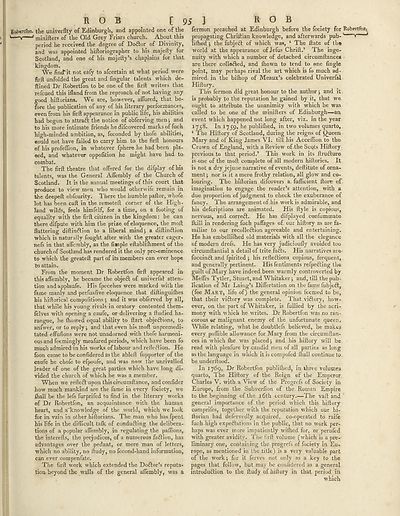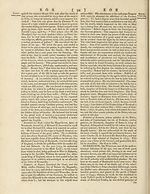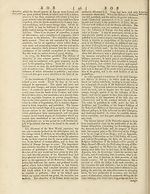Encyclopaedia Britannica, or, a Dictionary of arts, sciences, and miscellaneous literature : enlarged and improved. Illustrated with nearly six hundred engravings > Volume 18, RHI-SCR
(103) Page 95
Download files
Complete book:
Individual page:
Thumbnail gallery: Grid view | List view

HOB [ 95 ] ROB
$ubertfon. the univerfity of Edinburgh, and appointed one of the
/ minifters of the Old Grey Friars church. About this
period he received the degree of Do&or of Divinity,
and was appointed hiftoriographer to his majefty for
Scotland, and one of his majefty’s chaplains for that
kingdom.
We fimTit not eafy to afcertain at what period were
firft unfolded the great and lingular talents which de-
ftined Dr Robertfon to be one of the firlt writers that
refcued this ifland from the reproach of not having any
good hiftorians. We are, however, aflured, that be¬
fore the publication of any of his literary performances,
even from his firlt appearance in public life, his abilities
had begun to attraft the notice of obferving men; and
to his more intimate friends hedifcovered marks of fuch
high-minded ambition, as, feconded by thofe abilities,
«ould not have failed to carry him to the firft honours
of his profeflion, in whatever fphere he had been pla-
eed, and whatever oppolition he might have had to
combat.
The firft theatre that offered for the difplay of his
talents, was the General Affembly of the Church of
Scotland. It is the annual meetings of this court that
produce to view men who would other wife remain in
the deepeft obfcurity. There the humble pallor, whofe
lot has been call in the remoteft corner of the High¬
land wilds, feels himfeif, for a time, on a footing of
equality with the firft citizen in the kingdom: he can
there difpute with him the prize of eloquence, the moft
flattering diftin&ion to a liberal mindj a diftinftion
which is naturally fought after with the greater eager-
nefs in that affembly, as the Ample eftablilhment of the
church of Scotland has rendered it the only pre-eminence
to winch the greateft part of its members can ever hope
to attain.
From the moment Dr Robertfon firft appeared in
this affemblv, he became the object of univerfal atten¬
tion and applaufe. His fpecehes were marked with the
fame manly and perfuafive eloquence that diftinguilhes
his hiftorical compofitions ; and it was obferved by all,
that while his young rivals in oratory contented them-
felves with opening a caufe, or delivering a ftudied ha¬
rangue, he (bowed equal ability to Hart obje&ions, to
anfwer, or to reply j and that even his moft unpremedi¬
tated effufions were not unadorned with thofe harmoni¬
ous and feemingly meafured periods, which have been fo
much admired in his works of labour and retleftion. He
foon came to be confidered as the ableft fupporter of the
caufe he chofe to efpoufe, and was now the unrivalled
leader of one of the great parties which have long di¬
vided the church of which he was a member.
When we reflesftupon thiscircumftance, andconfider
how much mankind are the fame in every fociety, we
lhall be the lefs furprifed to find in the literary works
of Dr Robertfon, an acquaintance with the human
heart, and a“K.nowledge of the world, which we look
for in vain in other hiftorians. The man who has fpent
his life in the difficult talk of conducing the delibera¬
tions of a popular affembly, in regulating the paffions,
the interefts, the prejudices, of a numerous faction, has
advantages over the pedant, or mere man of letters,
which no ability, no ftudy, no fecond-hand information,
can ever compenfate.
The firft work which extended the Doctor’s reputa¬
tion beyond the walls of the general affembly, was a
fermon preached at Edinburgh before the fociety for RobertfoBi
propagating Chriftian knowledge, and afterwards pub- ^ »
lilhed j the fubjedt of which was, ‘ The ftate of th®
world at the appearance of Jefus Chrift.’ The inge¬
nuity with which a number of detached circumftances
are there collodled, and Ihown to tend to one lingle
point, may perhaps rival the art which is fo much ad¬
mired in the bilhop of Meaux’s celebrated Univerfal
Hiftory.
This fermon did great honour to the author j and it
is probably to the reputation he gained by it, that we
ought to attribute the unanimity with which he was
called to be one of the minifters of Edinburgh—-an
event which happened not long after, viz. in the year
1758. In 1759, he publilhed, in two volumes quarto,
‘ The Hiftory of Scotland, during the reigns of Queen
Mary and of King James VI. till his Acceflion to the
Crown of England, with a Review of the Scots Hiftory
previous to that period.’ This work in its ftrudture
is one of the moft complete of all modern hiftories. It
is not a dry jejune narrative of events, deftitute of orna¬
ment; nor is it a mere frothy relation, all glow and co¬
louring. The hiftorian difcovers a fufticient ftore of
imagination to engage the reader’s attention, with a
due proportion of judgment to check the exuberance of
fancy. The arrangement of his work is admirable, and
his defcriptions are animated. His ftyle is copious,
nervous, and correct. He has difplayed confummate
(kill in rendering fuch paffages of our hiftory as are fa¬
miliar to our recolleftion agreeable and entertaining.
He has embellilhed old materials with all the elegance
of modern drefs. He has very judicioufly avoided too
circumftantial a detail of trite fads. His narratives are
fuccind and fpirited ; his refledions copious, frequent,
and generally pertinent. His fentiments refpeding the
guilt of Mary have indeed been warmly controverted by
Meffrs Tytler, Stuart, and Whitaker; and, till the pub¬
lication of Mr Laing’s Differtation on the fame fubjed,
(fee Mary, life of) the general opinion feemed to be,
that their vidory was complete. That vidory, how¬
ever, on the part of Whitaker, is fullied by the acri¬
mony with which he writes. Dr Robertfon Avas no ran¬
corous ox malignant enemy of the unfortunate queen.
While relating, what he doubtlefs believed, he makes
every poflible allowance for Mary from the circumftan¬
ces in which (he wras placed; and his hiftory will be
read with pleafure by candid men of all parlies as long
as the language in which it is compofed lhall continue tp.
be underftood.
In 1769, Dr Robertfon publiffied, in three volumes
quarto, The Hiftory of the Reign of the Emperor
Charles V. with a View of the Progrefs of Society in
Europe, from the Subverfion of the Roman Empire
to the beginning of the 16th century.—The vaft and
general importance of the period which this hiftory
comprifes, together with the reputation which our hi¬
ftorian had defervedly acquired, co-operated to raife
fuch high expedations in the public, that no work per¬
haps was ever more impatiently wilhed for, or perufed
with greater avidity. The firft volume (which is a pre¬
liminary one, containing the progrefs of fociety in Eu¬
rope, as mentioned in the title) is a very valuable part
of the wrork; for it ferves not only as a key to the
pages that follow, but may be confidered as a general
introdudion to the ftudy of hiftory in that period in
Avhich
$ubertfon. the univerfity of Edinburgh, and appointed one of the
/ minifters of the Old Grey Friars church. About this
period he received the degree of Do&or of Divinity,
and was appointed hiftoriographer to his majefty for
Scotland, and one of his majefty’s chaplains for that
kingdom.
We fimTit not eafy to afcertain at what period were
firft unfolded the great and lingular talents which de-
ftined Dr Robertfon to be one of the firlt writers that
refcued this ifland from the reproach of not having any
good hiftorians. We are, however, aflured, that be¬
fore the publication of any of his literary performances,
even from his firlt appearance in public life, his abilities
had begun to attraft the notice of obferving men; and
to his more intimate friends hedifcovered marks of fuch
high-minded ambition, as, feconded by thofe abilities,
«ould not have failed to carry him to the firft honours
of his profeflion, in whatever fphere he had been pla-
eed, and whatever oppolition he might have had to
combat.
The firft theatre that offered for the difplay of his
talents, was the General Affembly of the Church of
Scotland. It is the annual meetings of this court that
produce to view men who would other wife remain in
the deepeft obfcurity. There the humble pallor, whofe
lot has been call in the remoteft corner of the High¬
land wilds, feels himfeif, for a time, on a footing of
equality with the firft citizen in the kingdom: he can
there difpute with him the prize of eloquence, the moft
flattering diftin&ion to a liberal mindj a diftinftion
which is naturally fought after with the greater eager-
nefs in that affembly, as the Ample eftablilhment of the
church of Scotland has rendered it the only pre-eminence
to winch the greateft part of its members can ever hope
to attain.
From the moment Dr Robertfon firft appeared in
this affemblv, he became the object of univerfal atten¬
tion and applaufe. His fpecehes were marked with the
fame manly and perfuafive eloquence that diftinguilhes
his hiftorical compofitions ; and it was obferved by all,
that while his young rivals in oratory contented them-
felves with opening a caufe, or delivering a ftudied ha¬
rangue, he (bowed equal ability to Hart obje&ions, to
anfwer, or to reply j and that even his moft unpremedi¬
tated effufions were not unadorned with thofe harmoni¬
ous and feemingly meafured periods, which have been fo
much admired in his works of labour and retleftion. He
foon came to be confidered as the ableft fupporter of the
caufe he chofe to efpoufe, and was now the unrivalled
leader of one of the great parties which have long di¬
vided the church of which he was a member.
When we reflesftupon thiscircumftance, andconfider
how much mankind are the fame in every fociety, we
lhall be the lefs furprifed to find in the literary works
of Dr Robertfon, an acquaintance with the human
heart, and a“K.nowledge of the world, which we look
for in vain in other hiftorians. The man who has fpent
his life in the difficult talk of conducing the delibera¬
tions of a popular affembly, in regulating the paffions,
the interefts, the prejudices, of a numerous faction, has
advantages over the pedant, or mere man of letters,
which no ability, no ftudy, no fecond-hand information,
can ever compenfate.
The firft work which extended the Doctor’s reputa¬
tion beyond the walls of the general affembly, was a
fermon preached at Edinburgh before the fociety for RobertfoBi
propagating Chriftian knowledge, and afterwards pub- ^ »
lilhed j the fubjedt of which was, ‘ The ftate of th®
world at the appearance of Jefus Chrift.’ The inge¬
nuity with which a number of detached circumftances
are there collodled, and Ihown to tend to one lingle
point, may perhaps rival the art which is fo much ad¬
mired in the bilhop of Meaux’s celebrated Univerfal
Hiftory.
This fermon did great honour to the author j and it
is probably to the reputation he gained by it, that we
ought to attribute the unanimity with which he was
called to be one of the minifters of Edinburgh—-an
event which happened not long after, viz. in the year
1758. In 1759, he publilhed, in two volumes quarto,
‘ The Hiftory of Scotland, during the reigns of Queen
Mary and of King James VI. till his Acceflion to the
Crown of England, with a Review of the Scots Hiftory
previous to that period.’ This work in its ftrudture
is one of the moft complete of all modern hiftories. It
is not a dry jejune narrative of events, deftitute of orna¬
ment; nor is it a mere frothy relation, all glow and co¬
louring. The hiftorian difcovers a fufticient ftore of
imagination to engage the reader’s attention, with a
due proportion of judgment to check the exuberance of
fancy. The arrangement of his work is admirable, and
his defcriptions are animated. His ftyle is copious,
nervous, and correct. He has difplayed confummate
(kill in rendering fuch paffages of our hiftory as are fa¬
miliar to our recolleftion agreeable and entertaining.
He has embellilhed old materials with all the elegance
of modern drefs. He has very judicioufly avoided too
circumftantial a detail of trite fads. His narratives are
fuccind and fpirited ; his refledions copious, frequent,
and generally pertinent. His fentiments refpeding the
guilt of Mary have indeed been warmly controverted by
Meffrs Tytler, Stuart, and Whitaker; and, till the pub¬
lication of Mr Laing’s Differtation on the fame fubjed,
(fee Mary, life of) the general opinion feemed to be,
that their vidory was complete. That vidory, how¬
ever, on the part of Whitaker, is fullied by the acri¬
mony with which he writes. Dr Robertfon Avas no ran¬
corous ox malignant enemy of the unfortunate queen.
While relating, what he doubtlefs believed, he makes
every poflible allowance for Mary from the circumftan¬
ces in which (he wras placed; and his hiftory will be
read with pleafure by candid men of all parlies as long
as the language in which it is compofed lhall continue tp.
be underftood.
In 1769, Dr Robertfon publiffied, in three volumes
quarto, The Hiftory of the Reign of the Emperor
Charles V. with a View of the Progrefs of Society in
Europe, from the Subverfion of the Roman Empire
to the beginning of the 16th century.—The vaft and
general importance of the period which this hiftory
comprifes, together with the reputation which our hi¬
ftorian had defervedly acquired, co-operated to raife
fuch high expedations in the public, that no work per¬
haps was ever more impatiently wilhed for, or perufed
with greater avidity. The firft volume (which is a pre¬
liminary one, containing the progrefs of fociety in Eu¬
rope, as mentioned in the title) is a very valuable part
of the wrork; for it ferves not only as a key to the
pages that follow, but may be confidered as a general
introdudion to the ftudy of hiftory in that period in
Avhich
Set display mode to:
![]() Universal Viewer |
Universal Viewer | ![]() Mirador |
Large image | Transcription
Mirador |
Large image | Transcription
Images and transcriptions on this page, including medium image downloads, may be used under the Creative Commons Attribution 4.0 International Licence unless otherwise stated. ![]()
| Permanent URL | https://digital.nls.uk/193020046 |
|---|
| Attribution and copyright: |
|
|---|
| Description | Ten editions of 'Encyclopaedia Britannica', issued from 1768-1903, in 231 volumes. Originally issued in 100 weekly parts (3 volumes) between 1768 and 1771 by publishers: Colin Macfarquhar and Andrew Bell (Edinburgh); editor: William Smellie: engraver: Andrew Bell. Expanded editions in the 19th century featured more volumes and contributions from leading experts in their fields. Managed and published in Edinburgh up to the 9th edition (25 volumes, from 1875-1889); the 10th edition (1902-1903) re-issued the 9th edition, with 11 supplementary volumes. |
|---|---|
| Additional NLS resources: |
|

